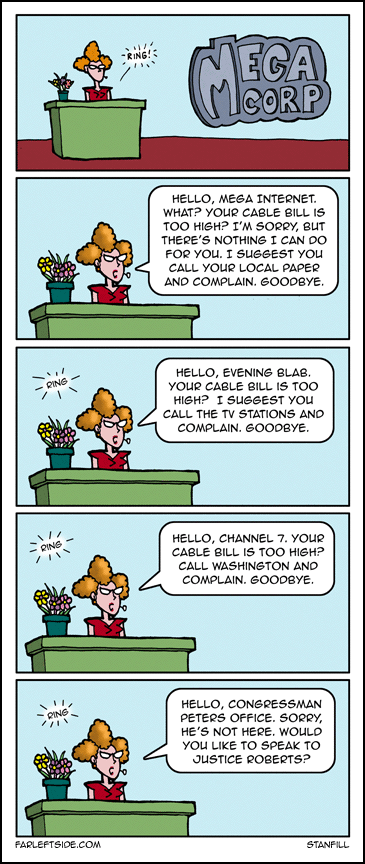It is no coincidence that immediately after federal courts invalidated the FCC’s rules enforcing network neutrality (which means that your ISPs can discriminate against any content that competes with them, or which they simply don’t like), that Comcast announces that they are paying billions of dollars to acquire Time Warner Cable. The death of network neutrality gives them the ability to extort as much money as they want from you, the internet consumer. But first they have to eliminate their main competition.
How bad is Comcast acquiring Time Warner? Even business friendly Bloomberg news says that it will be bad for America:
The reason this deal is scary is that for the vast majority of businesses in 19 of the 20 largest metropolitan areas in the country, their only choice for a high-capacity wired connection will be Comcast. Comcast, in turn, has its own built-in conflicts of interest: It will be serving the interests of its shareholders by keeping investments in its network as low as possible — in particular, making no move to provide the world-class fiber-optic connections that are now standard and cheap in other countries — and extracting as much rent as it can, in all kinds of ways. Comcast, for purposes of today’s public , is calling itself a “cable company.” It no longer is. Comcast sells infrastructure subject to neither competition nor a cop on the beat.
For a country attempting to compete on the global stage, this is a problem. It’s time to recognize that industrial policy — true leadership, the kinds of initiatives that brought us the federal highway system and national electrification — is called for. If regulating these guys is too difficult, let’s allow mayors to build alternative fiber-optic networks such as the one in Chattanooga, Tennessee, that has lured businesses and spurred economic growth. We can’t allow our future to be captured by the short-term cash flow desires of Comcast’s investors.
If all of this sounds technical, try this: We’re all the people of Fort Lee, New Jersey, trying to get on the George Washington Bridge. There’s a bully narrowing our access to the world whose interests aren’t aligned with ours. What we need is for that bridge to be maintained, for traffic to flow and for the bully to get punched in the nose, collectively, by the entire country. Let’s be clear: This is old-school monopolistic behavior.
It is time to contact our representatives and insist that we get a law protecting network neutrality and eliminating this new kind of monopoly in our increasingly important technology infrastructure.
UPDATE: Comcast has given millions of dollars to the members of Congress who are supposed to responsible for the FCC. As we always say, follow the money!
UPDATE 2: Michael Copps, who was an FCC commissioner from 2001 until 2011, says that the Comcast merger with Time Warner is a terrible idea and that the merger would “run roughshod over consumers in the end.” And he should know, since he watched similar mergers create monsters out of News Corp (owner of Fox News) and Clear Channel (home of Rush Limbaugh and many other conservative talk radio shows). But according to Copps, the worst consolidation by far was the Comcast merger with NBCUniversal. Copps was the only commissioner to vote against that merger.



2 Comments
Privately owned highways are just a bad idea all around. Internet access is as basic infrastructure as anything made from brick and mortar and should be maintained for public benefit.
Thanks a bunch for the link to whoismyrepresentative.com
I contact my congressservants often enough to have their numbers easily accessible but I’m sending this link to friends and family.
I wish I could claim that internet not being regulated as a utility is a surprise. With how much depends on it today, from the day to day business of emails and VOIP conferences to entire industries (most of PC gaming and a lot of the games industry in general is dependent on internet, not to mention Netflix, Amazon, newspapers etc) it is disgusting that elected officials don’t take a stand for these businesses and rather look directly to the cable giants for their marching orders.
The only thing that gives me hope are companies like DC Access, small ISPs that appear to still be on the side of the consumer. Unfortunately these companies don’t stand much a chance in the face of the major providers, and their service isn’t always up to the level that the giants’ is. Nor do they have the reach to challenge the progress-stifling practices of the big kids on the block.